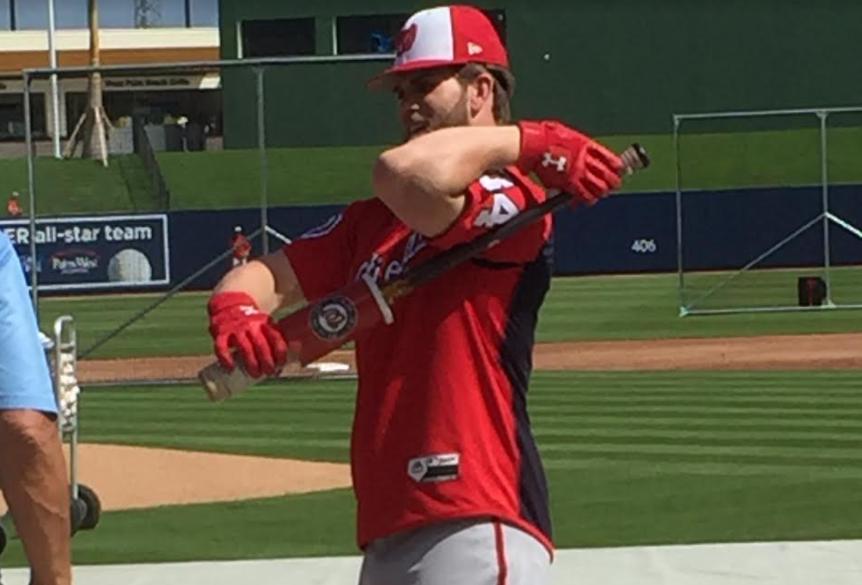My bucket list diminished by one as I spent three days last week with an Oxford friend at the Ballpark of the Palm Beaches in West Palm Beach, FL
It was surreal as I chose to do little else but spend several hours every day watching baseball at a spanking new ballpark shared by the Houston Astros and the Washington Nationals. For years, I’ve often thought about being a spring training spectator.
And so I did, with great enjoyment and pure delight.
 This ballpark opened on Tuesday, Feb. 28, 2017, one day before our arrival. Surrounded by 12 practice diamonds, six for each team, the 6,500-seat main stadium is the centerpiece of a $150 million venue. I could only marvel at an impressive sports complex established to do one thing: train major- and minor leaguers to perform at the highest level possible in a first-class facility.
This ballpark opened on Tuesday, Feb. 28, 2017, one day before our arrival. Surrounded by 12 practice diamonds, six for each team, the 6,500-seat main stadium is the centerpiece of a $150 million venue. I could only marvel at an impressive sports complex established to do one thing: train major- and minor leaguers to perform at the highest level possible in a first-class facility.
Sports dominate our American culture. My three-day immersion in spring training confirmed that commentary. Athleticism and entertainment draw fans galore.
We watched quality baseball played by the Miami Marlins, the Houston Astros, St. Louis Cardinals and the Washington Nationals. Despite my Baltimore roots, I’ve grown to like the Nationals, perhaps because a college friend is a principal owner.
One day we had field access before a game and watched batting practice just 10-to-15 feet away. I felt like a kid in a candy store. I watched major league ball players, including stars like Bryce Harper and Jayson Werth, smack a little ball around the field and sometimes beyond.
Prior to our field visit, we toured the Nationals offices and fitness center. We were allowed to look but not walk into the locker room. I’ve never seen the off-field facilities of any professional sports team.
What I didn’t see during my three-day excursion to spring training was a relaxed atmosphere, where players would mingle with the fans. That surprised me based on stories I’ve heard over the years. What I didn’t see was idle chatter among the athletes, or even a flash of lackadaisical play.
Young players seeking scarce spots on a major league team are constantly trying to impress their coaches and managers. Veterans, looking over their shoulders at up and coming ballplayers, are trying to keep their jobs. Shoddy performance is discouraged.

Bryce Harper
Notwithstanding the smaller size of the building itself—though the size of the field is comparable to Major League parks–the level of the baseball play was highly professional. This would be no surprise; spring training is work for all involved. Opening Day is a month away.
I loved the experience. No longer will I wonder about spring training in sunny Florida. While the crowd had its share of retirees and vacationers, it also drew parents and children eager to enjoy the American pastime, an abundant share of team jerseys and shirts and a prevalence of good feelings.
I noticed something else. Baseball is far more relaxing than pro football; it’s a subtler, more nuanced sport that generates subdued appreciation. Embodying controlled violence, pro football elicits rawer emotions from its spectators than does baseball. Post-game reactions to these two sports are vastly different.
After more than 520 words, I have said little about the wonderful weather. For the most part, it was pleasantly warm, mostly sunny and sometimes cloudy. I almost felt like a long-term snowbird who hears about terrible weather in the north and takes pride in enjoying warm and inviting Florida.
I suspect my bucket list experience will not be one and done. I just may watch the Orioles play next winter in Sarasota, FL–to be true to my roots.
Columnist Howard Freedlander retired in 2011 as Deputy State Treasurer of the State of Maryland. Previously, he was the executive officer of the Maryland National Guard. He also served as community editor for Chesapeake Publishing, lastly at the Queen Anne’s Record-Observer. In retirement, Howard serves on the boards of several non-profits on the Eastern Shore, Annapolis and Philadelphia.



Write a Letter to the Editor on this Article
We encourage readers to offer their point of view on this article by submitting the following form. Editing is sometimes necessary and is done at the discretion of the editorial staff.